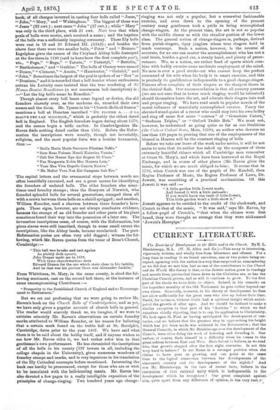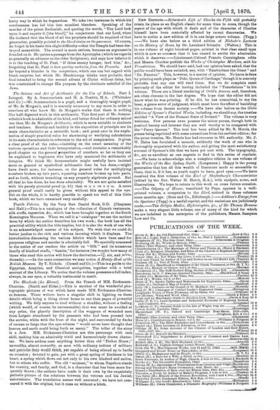CURRENT LITERATURE.
The Doctrine of Development in the Bible and in the Church. By E. L. Blenkinsopp, M.A. (W. H. Allen and Co.)—Thin essay is interesting, vigorously written, and wholly free from bitterness and offence. For a long time in reading it we found ourselves, one or two points being ex- cepted, agreeing with the anther in a way that surprised us, remembering as we did that we met him last as one of the contributors to the Church and the Irorld. His theory is that, as the Jewish nation grow in theology and morals from patriarchal times down to the Christian era, so has the Christian Church grown, and so will it continue to grow. To the first part of his thesis we have little to object. Indeed, in his remarks on the imperfect morality of the Old Testament he goes rather beyond our own views. Generally, however, in his theory of development he does not allow sufficiently for the great men who rise up before their time. David, for instance, without doubt bad a spiritual insight which antici- pated the growth of after ages. And we should be inclined to make a similar exception to that part of his " doctrine " to which we find ourselves chiefly objecting, that is to say, its application to Christianity. We look upon St. Paul as having anticipated the development of cen- turies, and wo believe that the greatest stop in approaching his height which has yet been made was achieved in the Reformation ; that the General Councils, in which Mr. Blenkinsopp sees the development of the Church, were often doing the work of lowering and dwarfing it. Our author, of course, Buds himself in a difficulty when he comes to the great schism between East and West. He is forced to believe, as we read him, that growth stopped after the first eight centurion. Is not this very hard to believe ? Is not Rome in a stronger position when she claims to have gone on growing, and can point at the same time to the logical connection between her developments of the nineteenth century and the developments of the eighth ? And can Mr. Blenkinsopp, in the face of recent facts, believe in the restoration of that external unity which is indispentsablo to the development which he recognizes ? Our great complaint against, him, quite apart from any difference of opinion, is the very rash ,r. hasty way in which he dogmatizes. We take two instances in which his carelessness has led him into manifest blunders. Speaking of the murder of the priest Zechariah, and quoting the words, "The Lord look upon it and requite it [the blood]," he conjectures that our Lord, when He declared that the blood of all the prophets should be required of that generation, possibly pointed to the blood-stains on the pavement. Of course, he forgot in his haste this slight difficulty—that the Temple had been des- troyed meanwhile. The second is more serious, because an argument is founded on it. He quotes a passage from the Apocrypha (which he regards as generally an advance on the older Scriptures), and says how inferior it is to the teaching of St. Paul, " If thine enemy hunger, feed him," &c., forgetting that St. Paul is here quoting verbatim from the Proverbs. And far beyond a blunder is the conjecture, which one can but regard with blank surprise, but which Mr. Blenkinsopp thinks very probable, that God intended to bring the second advent of Christ without delay, but was constrained to change His purpose by the obstinate unbelief of the Jews.



































 Previous page
Previous page